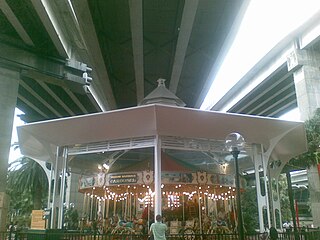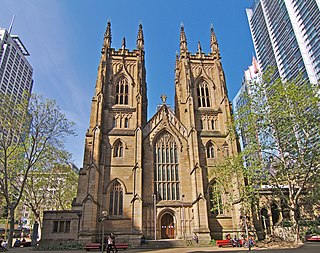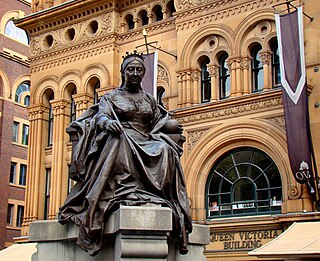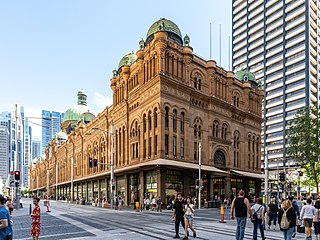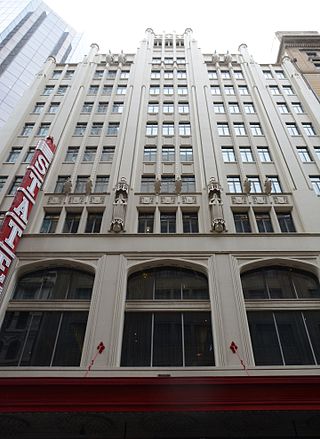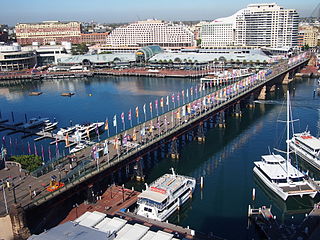Self-guided Sightseeing Tour #3 in Sydney, Australia
Legend
Guided Free Walking Tours
Book free guided walking tours in Sydney.
Guided Sightseeing Tours
Book guided sightseeing tours and activities in Sydney.
Tour Facts
2.1 km
91 m
Experience Sydney in Australia in a whole new way with our free self-guided sightseeing tour. This site not only offers you practical information and insider tips, but also a rich variety of activities and sights you shouldn't miss. Whether you love art and culture, want to explore historical sites or simply want to experience the vibrant atmosphere of a lively city - you'll find everything you need for your personal adventure here.
Activities in SydneyIndividual Sights in SydneySight 1: Tumbalong Park
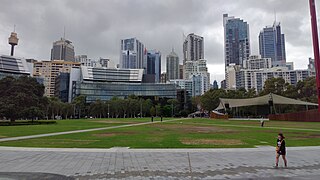
Tumbalong Park is a park in Darling Harbour, Sydney, Australia. The park was designed using native Australian foliage decorated with fountains as an urban stream. The name "Tumbalong" is from Dharug as spoken by the Eora people and means "place where seafood is found".
Sight 2: Darling Harbour Carousel
The Darling Harbour Carousel is a heritage-listed carousel located at the concourse under the Western Distributor at Darling Harbour in the Sydney central business district in the City of Sydney local government area, New South Wales, Australia. It is also known as The Carousel. It was added to the New South Wales State Heritage Register on 28 June 2002.
Sight 3: St Andrews Cathedral
St Andrew's Cathedral is a cathedral church of the Anglican Diocese of Sydney in the Anglican Church of Australia. The cathedral is the seat of the Anglican Archbishop of Sydney and Metropolitan of New South Wales. The position of Dean of Sydney has been held by the Very Reverend Sandy Grant since 9 December 2021.
Sight 4: Queen Victoria Monument
The seated Statue of Queen Victoria, currently in Sydney, New South Wales, Australia, was made by John Hughes in 1908 and was originally located in Dublin. Made of bronze, it is situated on the corner of Druitt and George Street in front of the Queen Victoria Building. It was the last royal statue to have been erected in Ireland.
Sight 5: Queen Victoria Building
The Queen Victoria Building is a heritage-listed late-nineteenth-century building located at 429–481 George Street in the Sydney central business district, in the state of New South Wales, Australia. Designed by the architect George McRae, the Romanesque Revival building was constructed between 1893 and 1898 and is 30 metres (98 ft) wide by 190 metres (620 ft) long. The domes were built by Ritchie Brothers, a steel and metal company that also built trains, trams and farm equipment. The building fills a city block bounded by George, Market, York, and Druitt Streets. Designed as a marketplace, it was used for a variety of other purposes, underwent remodelling, and suffered decay until its restoration and return to its original use in the late twentieth century. The property is co-owned by the City of Sydney and Link REIT, and was added to the New South Wales State Heritage Register on 5 March 2010.
Sight 6: State Theatre
The State Theatre is a 2034 seat heritage listed theatre located at 47–51 Market Street, in the Sydney central business district in the City of Sydney local government area of New South Wales, Australia. The theatre was designed by Henry Eli White with assistance from John Eberson and built between 1926 and 1929. It hosts film screenings, live theatre and musical performances, and since 1974 it has been the home of the annual Sydney Film Festival. It is also known as State Building and Wurlitzer Organ. The property is privately owned. It was added to the New South Wales State Heritage Register on 2 April 1999.
Sight 7: Pyrmont Bridge
The Pyrmont Bridge, a heritage-listed swing bridge across Cockle Bay, is located in Darling Harbour, part of Port Jackson, west of the central business district in the City of Sydney local government area of New South Wales, Australia. Opened in 1902, the bridge initially carried motor vehicle traffic via the Pyrmont Bridge Road between the central business district and Pyrmont. Since 1981 the bridge has carried pedestrian and bicycle traffic only, as motor vehicles were diverted to adjacent freeway overpasses. The bridge was added to the New South Wales State Heritage Register on 28 June 2002, the centenary of its opening.
Share
Disclaimer Please be aware of your surroundings and do not enter private property. We are not liable for any damages that occur during the tours.
GPX-Download For navigation apps and GPS devices you can download the tour as a GPX file.
